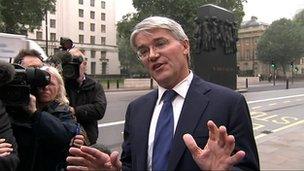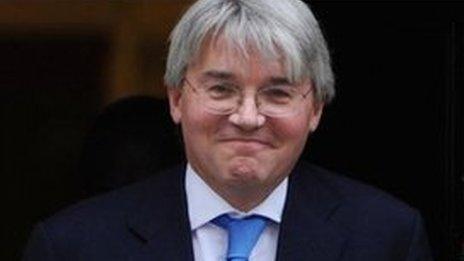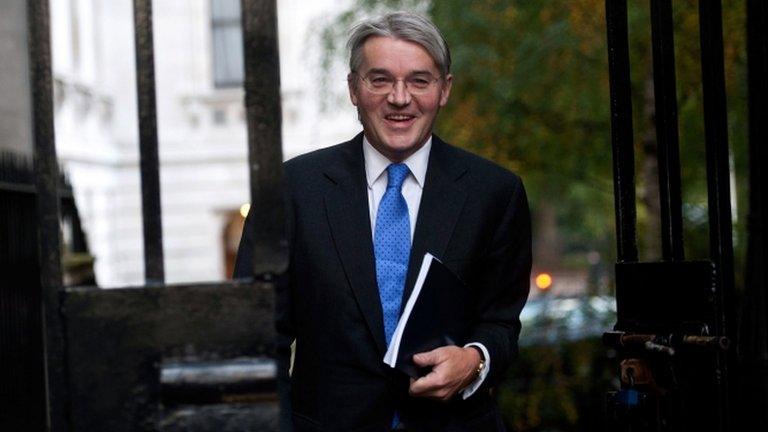Andrew Mitchell resigns over police comments row
- Published
- comments

Mr Mitchell has been under pressure over the remarks for weeks
Andrew Mitchell has quit as government chief whip after weeks of pressure over an argument with police officers in Downing Street.
The Tory MP has admitted swearing at officers in the incident but again denied calling police "plebs".
He told David Cameron - who has stood by him - that "damaging publicity" meant he could no longer do his job.
Former Commons leader Sir George Young will be the new chief whip, Downing Street said.
Mr Mitchell's resignation is a victory for the Police Federation and Labour who have led calls for him to go.
But it spells the end of a 25-year political career for the Sutton Coldfield MP, who was promoted from international development secretary to chief whip in September's cabinet reshuffle.
BBC Political Editor Nick Robinson said Mr Mitchell told the prime minister about his decision in person, at Mr Cameron's country residence Chequers.
The prime minister has accepted his resignation.
'Learn your place'
In his resignation letter, Mr Mitchell says "it has become clear to me that whatever the rights and wrongs of the matter I will not be able to fulfil my duties as we both would wish.
"Nor is it fair to continue to put my family and colleagues through this upsetting and damaging publicity".
He repeats his "categorical assurance" that he did not call police officers "plebs" - as alleged in the police report on the incident.
But he adds: "The offending comment and the reason for my apology to the police was my parting remark 'I thought you guys were supposed to f***ing help us'.
"It was obviously wrong of me to use such bad language and I am very sorry about it and grateful to the police officer for accepting my apology."
Mr Mitchell - whose job was to maintain discipline on the Conservative benches - was thrust into the spotlight when The Sun accused him in a front page story of calling police "plebs".
His outburst came after armed police stopped him from cycling through the main Downing Street gate, instead directing him to the smaller pedestrian gate.
He is reported to have used foul language and told the officer at the gates to "learn your place" and "you don't run this government".
'Complete denial'
The officer concerned reported the incident to his superiors and the official police log, which appeared to contradict Mr Mitchell's story, was later leaked to the media.
Mr Mitchell came under intense pressure from the Police Federation - which represents rank-and-file officers - and which refused to accept his version of events.
The MP stayed away from the Conservative Party conference in an attempt to defuse the row, but despite the support of backbench Tory MPs it became clear when Parliament returned from recess on Monday that it was not going to go away.
Mr Mitchell's fate is believed to have been sealed on Wednesday, when deputy chief whip John Randall reportedly had to be talked out of quitting in protest at his determination to cling on, following a stormy prime minister's question time.
In his letter of reply to Mr Mitchell, Mr Cameron said he "understood" why Mr Mitchell was resigning, adding: "I regret this has become necessary."
Shadow cabinet office minister Michael Dugher, for Labour, said: "After weeks in complete denial, Andrew Mitchell has finally bowed to public pressure.
"What people will want to know is why, when the entire country could see that what Mr Mitchell did was wrong, the prime minister totally failed to act.
"David Cameron is left looking profoundly weak and totally out of touch, doing everything he could to hold on to Mr Mitchell only for his chief whip to bow to the inevitable given the understandable public anger."
'Honesty and integrity'
Nick Robinson said the fight had gone out of Mr Mitchell, who was considered to be a fighter and a former soldier who loved political scrapping.
Our correspondent said he had fallen victim to the persistence of the Labour Party - "who portrayed him as all that was worst about the government, symbolising one rule for those at the top and one for everyone else" - and the Police Federation who were fighting the government over cuts and reform.
"In the end he fell victim to his past behaviour, with too few people prepared to defend him, the tough guy paid for just being too tough", he added.
Paul McKeever, chairman of the Police Federation of England and Wales said: "It is not good to see anyone fall from public office but the decision by the prime minister to accept Andrew Mitchell's resignation seemed almost inevitable.
"Andrew Mitchell has apologised to our Metropolitan Police colleague and our colleague has accepted the apology. We hope this matter is now closed."
Tory MP Jacob Rees-Mogg said the incident had been "hugely exaggerated".
"Somebody lost his temper. Frankly, big deal. All sorts of people lose their temper in their daily lives, it's part of human nature. To blow this up into a resignation issue has been rather unfortunate and actually trivialises politics when there are many important things going on," he told BBC's Newsnight.
Mr Mitchell told our correspondent he will seek to deliver a personal resignation statement in the Commons early next week.
The new chief whip, Sir George Young, was thought to have retired to the backbenches after giving up his position as leader of the House of Commons in September's reshuffle.
The Tory grandee, who went to Eton and became an MP in 1974, had held the post since 2010, but was replaced by former health secretary, Andrew Lansley.
Sir George has some experience of the government whips office, serving there in 1990 and also acting as an opposition whip under Margaret Thatcher before she became prime minister in 1979.
During the 1980s and 1990s, he held a range of ministerial positions, including transport secretary in 1995.
- Published27 November 2014

- Published19 October 2012

- Published20 October 2012
